Hawk Mountain Enterprises Bad Attitude
Hawk Mountain Enterprises - Bad Attitude
Contributed by Frank Hermes
| Construction Rating: | starstarstarstarstar |
| Flight Rating: | starstarstarstarstar |
| Overall Rating: | starstarstarstarstar |
| Manufacturer: | Hawk Mountain Enterprises  |

Brief:
The Bad Attitude is an all-fiberglass 4" dual-deployment rocket that is designed to fly on 38mm to 75mm motors.
The Bad Attitude is equipped with a fiberglass piston ejection system for the main chute. The rocket comes standard
with a 24" long 54mm-fiberglass motor mount, but is also available with an optional 30" long 3" motor
mount (as described in this review) and can be flown with up to an M motor. Electronics bays are located in the
nosecone and in the mid-section coupler with G-10 mounting board.
Construction:
Kit contains a fiberglass (FG) nosecone with a pre-fabricated 18" x 38mm electronics bay and retention strap,
34" upper section FG airframe tube, a 1.5" FG mid-section airframe with a 10.5" FG coupler/electronics
bay with pre-drilled hole for the supplied key-switch and 'Remove Before Flight' flag, and a 48" booster FG
airframe section. I ordered the kit with the 75mm (in lieu of the 54mm MMT) FG MMT option, and the 4 each 3/16"
(in lieu of 1/8") G10 beveled fins. The kit is supplied with 3 each 1/2" CRs, all mounting hardware, ejection
charge canisters, and a G10 sled for the mid-section electronic bay, a FG piston assembly for the upper (main) airframe
section, all retention straps, shear pins and rivets and the main parachute. You only have to add electronics and a
drogue chute and you're ready to go. Workmanship of the supplied parts was superb, with only the nosecone seams
requiring a little work than you would expect given the rest of the kit parts condition.

The instructions were understandably brief considering this level of kit, but they covered all of the aspects peculiar to this kit, which really are not many. I detail the construction sequence below.
Note: I ordered the optional 30" x 75mm MMT option. Since the rocket is to be used as my Tripoli Level 3 certification project, I needed to be able to load an M-motor which are most typically found in 75mm or 94mm sizes. The stock booster section supplied in the kit is 48". I also ordered an additional 54" 94mm booster section that I will use with a Hawk Mountain aluminum fin can in a minimum-diameter variant for my next project (which I will report on at a later time).
The Bad Attitude is an all-fiberglass (FG) airframe. The parts are fabricated very well with tight tolerances and nice finish. Alan Gorecki has done a very nice job with the kit. Each part was checked, fitted, and tagged as necessary at Hawk Mountain before it was shipped, assuring there would be no issues upon arrival. I was delightfully surprised with all that had been included in the kit.
The Bad Attitude comes with an electronics bay mid-coupler section for the flight computers, as well as an e-bay in the nosecone for recovery trackers. I designed things so that the redundant flight computers would ride in the mid-section e-bay and the GPS and RF trackers in the nosecone e-bay.
Before I started any construction, I created a RockSim file since I could not find one out on the web. I wanted to be sure that the goals I set out for performance after a discussion with Alan prior to purchase seemed reasonable. Additionally, I wanted to be able to do the Center of Pressure (CP) and Center of Gravity (CG) calculations, as well as flight simulations for my Level 3 certification.
Working a 75mm MMT into a 94mm airframe gets a bit dicey since there is not much room between the two inside the airframe. I devised a few tools along the way to help the process and keep construction neat and tidy, particularly in regards to the epoxy.

The booster/MMT section utilizes a Kevlar® strapping system for safety retention. Safety is the key mark in any rocket design, particularly for high power, high flying, relatively heavy rockets such as the Bad Attitude. This Kevlar® strap is provided in the kit already knotted and furnished with a large ball-bearing swivel. All components in the kit are first-rate and designed to tolerate large mach speeds and gee forces--no compromises at any level in this kit.
The kit includes three MMT-to-booster centering rings (CR). The forward CR is a 1/2" birch plywood piece that is slotted on the 75mm ID on both sides to accommodate the strap. I passed the ends of the strap through either side of the CR and then folded each end and epoxied them to opposing sides of the MMT below the CR, which I had previously epoxied to the front end of the MMT.
I mounted the forward CR and strap to the MMT with Loctite Hysol E-20HP epoxy. This epoxy is an industrial grade epoxy with a shear strength of over 4500 PSI and is applied with a gun system that dispenses the 2:1 ratio ingredients perfectly through a mixing nozzle, eliminating the tedious task of measuring and mixing. I used this epoxy throughout the construction except for tacking the fins in place and creating the exterior fin fillets (see the fin section below).

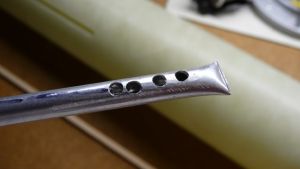

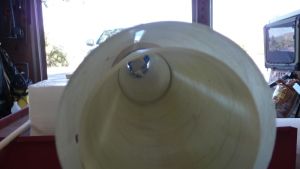
For motor retention/safety, I am using a 75mm Aero Pack Quick-Change motor retainer. I had to pre-install (dry) the retainer in order to determine the exact location of the MMT within the booster airframe such that the CRs and the fins would align correctly with the slots of the booster section.
After marking the proper locations on the MMT and the booster and taking care to sand all the FG surfaces on the booster and the MMT that would be subject to epoxy, I applied a coat of epoxy to the inside of the airframe for the forward CR with a small brush taped to the end of a long wooden dowel. I then tucked the Kevlar® safety strap into the MMT to prevent getting any epoxy on it and installed the MMT by sliding it in through the rear of the booster. This allowed me to minimize the internal epoxy smear and create a small fillet on the forward part of the CR. I placed the aft CR on temporarily to keep the rear of the MMT centered in the booster while the forward ring's epoxy dried.
With the forward CR now firmly fixed, I made a special applicator extension for applying the epoxy for the middle CR out of a 12" piece of 0.25" aluminum tube. I crimped one end of the tube and drilled a series of small holes in one side and then taped the other end to one of a plastic mixing nozzles. By sliding the aluminum tube between the MMT and the booster before dispensing any of the epoxy, I was able to apply epoxy just where it was needed on the inside of the airframe and outside of the MMT, just ahead of the fin slots, resulting in a minimum of epoxy and mess.
After applying the epoxy, I pushed the middle CR up the rear of the MMT with a couple of small diameter dowels on each side of the MMT until the CR reached the marks I had made earlier for its final position. Again, the epoxy smear was minimized while still creating a good, uniform bond for the CR to the MMT and the airframe. Once that set, I was ready to attach the fins.
Copying the basic idea for a fin jig from Vern Knowles' terrific web site, I set out to make one of my own. I added a couple of things that made the jig a little easier to true up the booster and the fins. By using a couple of Swanson Squares from a local hardware store, along with some fabricated straps and band clamps, I enhanced Vern's basic design slightly (see related article in a future "Rockets" magazine).
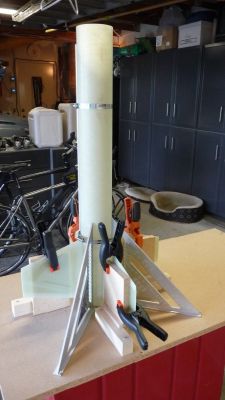
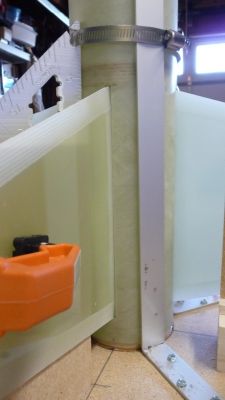
The squares keep the booster perfectly plumb relative to the jig's base. So, along with some carefully constructed L-shaped angles made from pine and composition board, clamping the fins into position for proper alignment and attachment became a relatively simple task.
Once the fins were tacked to the MMT and to the back of the middle CR with the E-120HP epoxy, I was ready to apply strengthening fillets to the interior portions of the fins. I taped off the small gaps between the fins and the fin slots on the outside of the airframe to keep any epoxy from running through to the face of the booster (the E-20HP is relatively thick/viscous and not much of a problem in this aspect). I taped off the rear of the MMT to keep it clean. I also created a rear dam for the fins with some pieces of closed-cell foam. I was able to push the foam up against the rear and overlap the fins slightly, creating a dam between the MMT and the airframe to contain the fillet epoxy during application. All these precautions allowed me not to have to worry about epoxy overflow since getting the epoxy cleanly into the small gap between the MMT and the airframe was a bit testy.
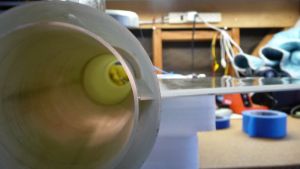

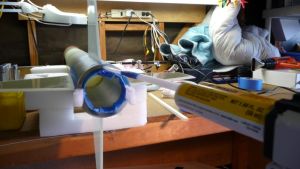

I made another tool for getting the epoxy up between the MMT and the airframe, this time using some Tygon tubing taped to the end of the epoxy mixing nozzle. Before pushing any epoxy out the end of the tubing/mixer nozzle, I ran the tubing up against the middle CR. I then laid a line of epoxy as I drew the tubing out. I sized the tubing such that drawing the tubing down between the MMT and the airframe created a nice fillet on both sides with a valley in the middle.
After the epoxy set for the interior fin fillets, I epoxied the rear CR in place.

I then moved on to the exterior fin fillets. I once again went to the Master and basically copied Vern Knowles' method of filleting fins using a short section of PVC pipe to smooth and shape the fillets. I used Aeropoxy for this process, mixing in some West System 406 Filler to give it a more thixotropic (thick) consistency. I used a heaping teaspoon of filler per ounce of mixed epoxy. I found that I needed to let the mixture of epoxy and filler sit for a few minutes before using it to allow it to reach its nominal working consistency (the "mayonnaise" state, as suggested on the 406 box).
I applied the mixture to the fillet area with tongue depressors. This gave me a nice applicator and also started the shaping process. Once I got a nominal amount of epoxy in the fin root area, I used the PVC pipe piece to form the final fillet by running it around the fin root several times and tending to the excess. I saw another modeler uses a plastic spoon in a similar fashion. Pre-taping the fins and airframe as shown On Vern site made cleanup a breeze.


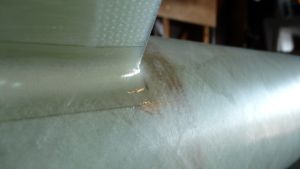

There is little to be done to the upper airframe and nosecone save for finishing and later, application of some shear pins and plastic rivets. The nosecone is pre-fabricated by HM and includes a retention strap. It will house both of the Big Red Bee trackers in its e-bay. I cut a friction-fit sled from a long piece of basswood and attached the RF and GPS trackers with a tie-wrap.
The nosecone seams required a bit of work to scrap/sand down in order to get a smooth finish prep for painting. In retrospect, after getting things smooth by scraping, I realized I should have probably filled/sanded the seam gaps rather than shave it in order to achieve the most rounded final form.
Since I had already built a fully redundant dual-deployment (DD) CO2-based recovery system electronics bay (see my modified AeroTech "More G-Force" article elsewhere on EMRR), I really only needed to "port" the devices and concepts over to the furnished Hawk Mountain e-bay.
Rather than use the smallish sled provided in the kit, I fabricated a larger 3.5" x 9.25" sled from some 0.125" G10 plate. Getting all that gear into the 4" x 8" e-bay of my former project was a challenge, so I wanted a bit more room this time out.



I am using a G-Wiz HCX as the primary flight computer/altimeter and an Ozark ARTS2 as the secondary. In the event that one of the manufacturers may have a software anomaly/bug, having two totally different computers should alleviate any related issue and allow deployment from at least one of them.
In keeping the two systems totally redundant/isolated, I am used a pair of C&K P2011U2WM03NQ2 (similar to the switch included in the Hawk Mountain kit, but the DPDT version) ON-OFF key-switches from Newark Electronics to connect each of the CPU and pyro batteries to each computer individually (total of 4 batteries). I used a pair of special audio-jacks (from Mouser) wired to provide 4-point shunts for the e-matches on the two Rouse-Tech CD3 CO2 ejection systems. I used a 12-gram CO2 system for smaller cavity of the booster (drogue) section and a 16-gram system for the upper airframe section housing the main chute.
Finishing:
I first went over all surfaces to be painted with a wet-sanding of 320 grit. The finish on the supplied tubes was
excellent with only a few pits and such to be filled. I first sprayed on a coat of Rustoleum Plastic Primer so I could
better see any flaws. I then filled any air bubbles or pits with Bondo filler paster (similar to Icing), a one-part,
easy to spread quick drying filler. I then sanded and primed again as needed.
I then applied three coats of gloss white, wet sanding in between with 320/400 grit as required. I finished it
off with some various widths of blue and black striping tape, added a few custom decals, and then a final coat of
protective clear gloss.

Once the finishing was done, I attached the fixed piece of the two-piece motor retainer to the MMT with JB Weld, a high-temp, strong two-part epoxy, as well as the rail launch-buttons that were thoughtfully included in the kit. I contoured the buttons to the airframe by sanding on a piece of sandpaper wrapped around a coupler tube and then secured to the fore and aft CRs with #8 screws and some epoxy.
Construction Rating: 5 out of 5
Flight:
Hawk Mountain designed this kit to fly J through M motors. I installed the 75mm MMT with the intent of using an M
motor for my Level 3 cert flight. This has not happened yet due to high winds, but I did test fly it with a CTI J1520
V-Max motor just to be sure it held together and got down OK on a motor that applied a lot of gees, though for a brief
time. The rocket flew straight with no roll to a height of 1828', just slightly less than the RockSim prediction.
Since the finished rocket is quite a bit in the overstable category, it needs a relatively high-thrust motor to get it flying quickly, particularly in windy conditions. So, I plan to use a AT M1550R for my cert flight, rather than the slow-burn M650 even though it would attain a higher altitude. I will follow up with a flight report on the M motor flight.
Recovery:
My dual-deployment stuff worked great. I used a 36" Giant Leap TAC-1 drogue and a Rocketman R12 (10') for the
main. The kit included a piston for the main chute. I originally thought I would not bother with it since I was using
the CD3 CO2 system, but Alan suggested I use it anyway. I think that is the right way to go, considering how tight the
fit is to get everything into the payload area. I put vent holes in both the booster and payload sections.
With the light motor, the decent rates were 40'/sec on the drogue and 24'/sec under the main. The main decent rate is a bit high (normal main decent target it 17-20'/sec) in anticipation of the larger M motor, but I am not sure I could get anything bigger into the payload section. With the ruggedness of the G10 construction I do not think it will be a problem. The only mark on the recovered rocket was when one of the fins must have banged against the nose cone when the main deployed. There was not even a scratch from the landing itself.
Flight Rating: 5 out of 5
Summary:
The fit and finish of the supplied parts is excellent. I expect to get many, many flights out of this rugged,
versatile kit.
NOTE: See Frank's modification article on the Bad Attitude as well.
Overall Rating: 5 out of 5
Other Reviews
- Hawk Mountain Enterprises Bad Attitude By Darren Wright
( Contributed - by Darren Wright) Brief: All fiberglass 4" HPR rocket capable of M flights. Construction: As is all of Hawk Mtn's kits, the BA is completely made up of spiral wound fiberglass. There are several options in the kit, and I modified the kit in a few ways, so I will note the differences. The kit came with: (1) 4' 4" Booster Tube, fin slots cut. (1) 4' ...
 |
 |
Flights
Sponsored Ads
 |
 |











